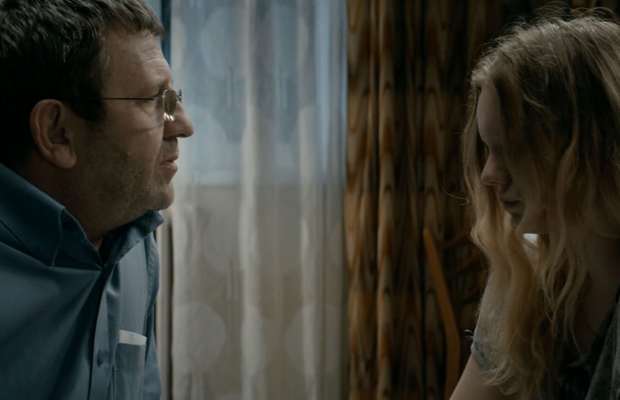In cinemas nationwide now
Graduation is an intricate, elegantly composed study of low-level corruption; of scratched backs, of greased wheels, of shady bureaucratic dealings. It’s also riddled with vicarious fatherly ambition and the regrets of the past poisoning the present. Adrian Titieni plays Romeo Aldea, a doctor from Cluj, whose daughter Eliza (Maria-Victoria Dragus) is offered a place at a prestigious English university, dependent on exam results. She survives an attempted rape, which affects her exam performance. Romeo starts to use his influence on various levels of the professional strata of Cluj to see what can be done to improve her prospects.
Right from the beginning, we can see the Transylvanian setting is still haunted by the vampiric figure of Nicolae Ceausescu. Romeo and his family reside in a tatty, Communist-era block of flats. His relationship with sallow, depressed wife Magda is ice-cold and he deeply regrets returning to Romania after the execution of the former dictator ended a period of exile. This political and historical context is hardly mentioned, but like Michael Haneke’s twin masterpieces of ambiguous guilt, Caché and The White Ribbon, it fizzes beneath the surface like a shoal of piranhas, ready to strip otherwise decent people to the bone.
Mungiu makes nothing obvious. For example, someone appears to have a grudge against Romeo. His house window is smashed at the beginning of the film, and later his car windscreen. No culprit is found. Is it just an embittered soul? Or part of a coordinated campaign, of which the attack on Eliza is also a component? The director sprinkles information on a need-to-know basis, and leaves the rest open to interpretation. It’s a stately, patient film that may frustrate those looking for a neat package with all loose ends tied up. As with his previous films, Mungiu is happy to allow the possibility of redemption or otherwise to dangle in some intangible future beyond the film’s limits. There is a moral heart, but the actions of every character are understandable.
This is complex, inquisitive film making that takes its local focus as indicative of global malaise. When Romeo refers to the UK as somehow beyond the reach of the corruption that riddles his life, it’s hard stifle a wry giggle. Like Asghar Farhadi in Iran, Mungiu uses the issues within his country to implicitly comment on humanity as a whole.
